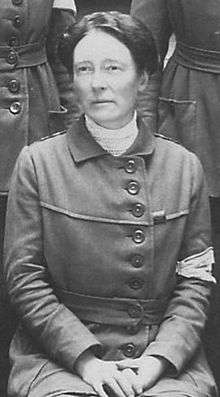Louisa Garrett Anderson
| Louisa Garrett Anderson | |
|---|---|
 | |
| Born |
28 July 1873 Aldeburgh, Suffolk, England |
| Died |
15 November 1943 (aged 70) Penn, Buckinghamshire, England |
| Education |
St Leonards School London School of Medicine for Women |
| Known for |
Military hospitals Campaigning for women's rights and social reform |
| Relatives |
Flora Murray (partner) Elizabeth Garrett Anderson (mother) Alan Garrett Anderson (brother) Millicent Fawcett (maternal aunt) |
| Medical career | |
| Profession | Physician |
| Notable prizes | CBE |
Dr. Louisa Garrett Anderson, CBE (28 July 1873 – 15 November 1943) was a medical pioneer, a member of the Women's Social and Political Union, a suffragette, and social reformer. She was the daughter of the founding medical pioneer Elizabeth Garrett Anderson, whom she wrote a biography of in 1939. Louisa was the Chief Surgeon of the Women's Hospital Corps (WHC) and a Fellow of the Royal Society of Medicine. Her aunt, Dame Millicent Fawcett, was a British suffragist. Louisa never married.
Early life and education
She was one of the three children of James George Skelton Anderson of the Orient Steamship Company co-owned by his uncle Arthur Anderson, and Elizabeth Garrett Anderson who was the first woman to qualify as a doctor, co-founder of the London School of Medicine for Women and Britain's first elected woman Mayor (of Aldeburgh).
She was educated at St Leonards School in St. Andrews, Fife and at the London School of Medicine for Women located at the Royal Free Hospital, where she worked as a doctor in private practice and hospitals.
Suffragette activity
.jpg)
In 1910 she made up a deputation with her mother Elizabeth Garrett Anderson and Alfred Caldecott who were allowed to put forward the case, for women to have the vote, to the Prime Minister. In 1912, she was imprisoned in Holloway, briefly, for her suffragette activities which included breaking a window by throwing a brick.
Medicine – WW1
In the First World War she served in France with the Women's Hospital Corps. Along with her friend and colleague Dr. Flora Murray, she established military hospitals for the French Army in Paris and Wimereux. Their proposals were at first rejected by the British authorities, but eventually the WHC became established at the military hospital, Endell Street Military Hospital, Holborn, London staffed entirely by women, from chief surgeon to orderlies. She wrote many medical articles.
Death
She is buried at the Holy Trinity Church with her partner and colleague, Dr. Flora Murray near to their home in Penn, Buckinghamshire. The inscription on her grave stone reads "Louisa Garrett Anderson, C.B.E., M.D., Chief Surgeon Women's Hospital Corps 1914–1919. Daughter of James George Skelton Anderson and Elizabeth Garrett Anderson of Aldeburgh, Suffolk. Born 28th. July 1873, died November 15. 1943. We have been gloriously happy."[1]
Archives
The archives of Louisa Garrett Anderson are held at The Women's Library at the Library of the London School of Economics, ref 7LGA.
Posthumous recognition
Her name and picture (and those of 58 other women's suffrage supporters) are on the plinth of the statue of Millicent Fawcett in Parliament Square, London, unveiled in 2018.[2][3][4]
See also
References
- ↑ Iain MacFarlaine (21 June 2002). "Louisa Garret Anderson". Medical Pioneer, Social Reformer. Find a Grave. Retrieved 17 August 2011.
- ↑ "Historic statue of suffragist leader Millicent Fawcett unveiled in Parliament Square". Gov.uk. 24 April 2018. Retrieved 24 April 2018.
- ↑ Topping, Alexandra (24 April 2018). "First statue of a woman in Parliament Square unveiled". The Guardian. Retrieved 24 April 2018.
- ↑ "Millicent Fawcett statue unveiling: the women and men whose names will be on the plinth". iNews. Retrieved 2018-04-25.
Other sources
- Geddes, Jennian F (Nov 2008). "Louisa Garrett Anderson (1873–1943), surgeon and suffragette". Journal of Medical Biography. 16 (4): 205–14. doi:10.1258/jmb.2007.007048. PMID 18952990.
- Geddes, Jennian F (Jan 2007). "Deeds and words in the suffrage military hospital in Endell Street". Medical history. 51 (1): 79–98. doi:10.1017/s0025727300000909. PMC 1712367. PMID 17200698.
External links
| Wikimedia Commons has media related to Louisa Garrett Anderson. |
- Elizabeth Garrett Anderson
- BBC page on Elizabeth Garrett Anderson
- Papers of Louisa Garrett Anderson
- Pictures at the National Portrait Gallery
- Biog and image of her gravestone. Ian MacFarlaine
- Women in the Great War – Women's Organisations in the British Army
- Wellcome Library – Military Hospital at Endell Street
- PubMed Central – Deeds and Words in the Suffrage Military Hospital in Endell Street – including photographs